OTRĀ SEMESTRA NOSLĒGUMA TESTI
Learn: in this unit, you're going to dive into some important vocabulary related to safety on ice and water. Whether you're skating on a frozen lake, enjoying a day at the beach, or simply exploring a river, understanding the right safety terms can help keep you safe. You'll learn about potential dangers, safety equipment, and key actions to take in emergencies.
Word bank:
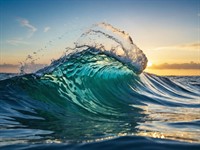
wave — [weɪv] — a movement of water caused by wind or other factors, sometimes hazardous for swimmers
As the storm raged, wave after wave pounded the rocky cliffs, sending mist high into the air like an oceanic roar.
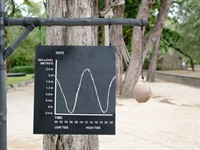
tide — [taɪd] — the regular rise and fall of sea levels caused by the gravitational pull of the moon and sun
The tide is like the ocean’s rhythm, rising higher onto the beach at some times and pulling back into the sea at others.
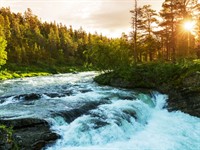
current — [ˈkʌr.ənt] — the continuous movement of water in a specific direction
The river's current was strong, pulling sticks and leaves downstream with a steady, powerful flow.
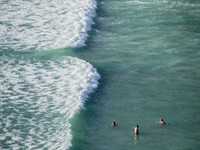
rip current — [ˈrɪp ˌkʌr.ənt] — a narrow, fast-moving water current that can pull swimmers away from the shore
Swimmers were warned to stay close to the shore because a dangerous rip current could pull them quickly out to deeper water.
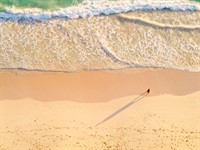
shoreline — [ˈʃɔː.laɪn] — the edge of a body of water where it meets the land
The children ran along the shoreline, where the waves gently lapped at the edge of the sand, leaving shimmering trails of foam.
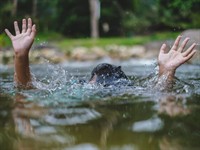
drown — [draʊn] — when someone suffocates in water due to an inability to breathe
He knew how to swim well, but the strong current almost caused him to drown before the lifeguard reached him in time.
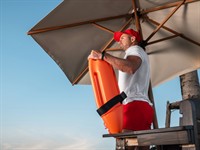
lifeguard — [ˈlaɪf.ɡɑːd] — a trained person who watches over people in or near water to prevent accidents and help in emergencies
The lifeguard blew his whistle and dived into the water, swimming quickly to rescue a struggling swimmer caught in the waves.
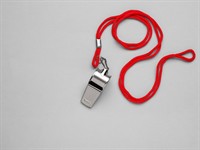
whistle — [ˈwɪs.əl] — a device often used by lifeguards to signal or get attention in emergencies
The lifeguard blew her whistle sharply, warning the swimmers to clear the water as a storm approached.
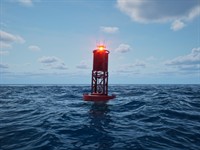
buoy — [bɔɪ] — a floating marker in the water, often indicating safe or dangerous areas
The bright orange buoy bobbed in the water, marking the spot where swimmers should stay within the safe zone.
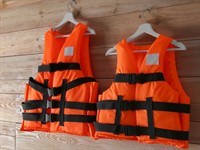
life jacket — [ˈlaɪf ˌdʒæk.ɪt] — a piece of equipment, like a jacket without sleeves, that is filled with air or light material and is designed to help you float if you fall into water
Before heading out on the boat, the captain reminded everyone to put on their life jackets for safety.
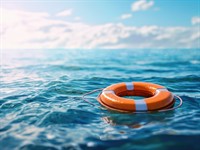
life ring — [laɪf rɪŋ] — a ring-shaped device used to assist a person struggling to stay afloat in water and at risk of drowning
The lifeguard threw a life ring to the swimmer who was caught in the rip current, pulling them to safety.
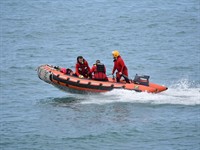
rescue boat — [ˈrɛs.kju boʊt] — a boat used for saving people from the water
When the storm hit, the rescue boat rushed into the choppy waters to save the stranded sailors.
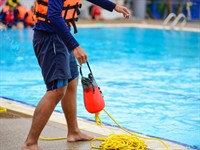
throw bag — [θroʊ bæg] — a bag containing a rope that can be thrown to someone in the water
The lifeguard quickly tossed the throw bag to the swimmer in trouble, allowing him to grab the rope and be pulled to safety.
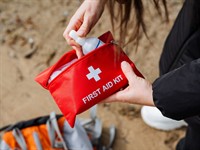
first aid kit — [ˌfɜːst ˈeɪd ˌkɪt] — a box or bag containing basic medical equipment such as bandages and antiseptic cream
The lifeguard reached for the first aid kit as soon as a swimmer scraped their leg on the rocky shore, ready to treat the wound.
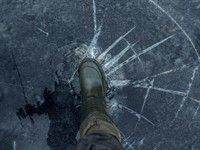
thin ice — [θɪn aɪs] — ice that is not thick or strong enough to safely support weight, posing a risk of breaking and falling through
The warning signs advised against walking on the frozen pond, as the thin ice could crack and send someone plunging into the cold water below.
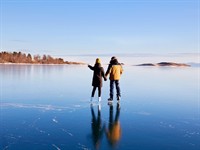
clear ice — [klɪər aɪs] — transparent or blue ice, generally stronger and safer than other types
The clear ice on the lake was so smooth and perfect for skating that it looked like a giant glass mirror reflecting the winter sky.
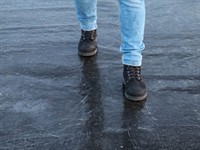
black ice — [blæk aɪs] — thin, transparent ice on roads; very slippery and dangerous for driving or walking
The roads were dangerously covered in black ice, making it nearly impossible to see, and causing cars to skid out of control.
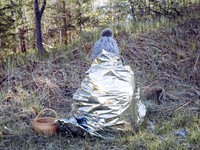
cold shock — [koʊld ʃɑk] — the body's reaction to sudden cold immersion, which can lead to rapid breathing or shock
As soon as he plunged into the icy lake, the cold shock hit him like a jolt of electricity, leaving him breathless and struggling to swim.
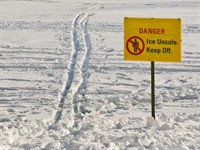
keep off — [kiːp ɒf] — to avoid something
The sign near the cliff edge read "Keep off," warning visitors to stay back from the dangerous drop.
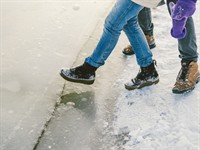
test — [test] — a way of discovering, by questions or practical activities, what someone knows, or what someone or something can do or is like
He carefully tapped his foot on the frozen pond to test the ice, listening for any cracks before venturing further.
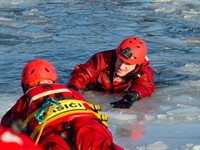
fall through — [fɔːl θruː] — a situation where someone falls through a thin or unstable surface, such as ice or a broken floor
As he stepped onto the thin ice, it suddenly cracked beneath him, and he began to fall through the freezing water below.
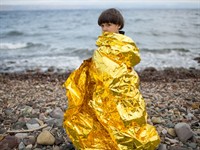
thermal blanket — [ˌθɜː.məl ˈblæŋ.kɪt] — a type of cover made of or covered with a very thin sheet of metal, used for keeping people warm in emergency situations
After the rescue, the paramedics wrapped the cold, shivering hiker in a thermal blanket to help raise his body temperature and protect him from hypothermia.
Atsauce:
Picture "Rip Current"- Emagnetic / Shutterstock.com
Picture "Kid covered in a thermal blanket" - punghi / Shutterstock.com
Picture "Firefighters" - TLF / Shutterstock.com
Picture "Rescurers on a boat" - Tommy Larey / Shutterstock.com
Picture "Kid covered in a thermal blanket" - punghi / Shutterstock.com
Picture "Firefighters" - TLF / Shutterstock.com
Picture "Rescurers on a boat" - Tommy Larey / Shutterstock.com